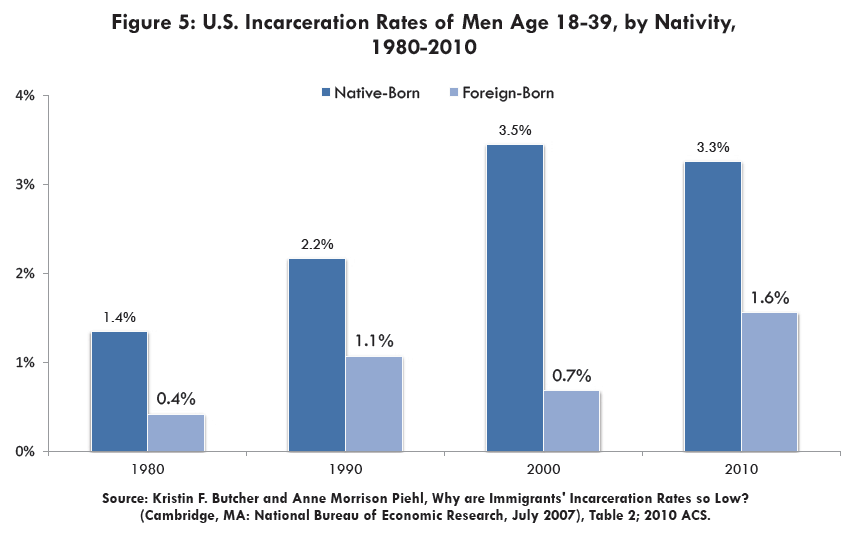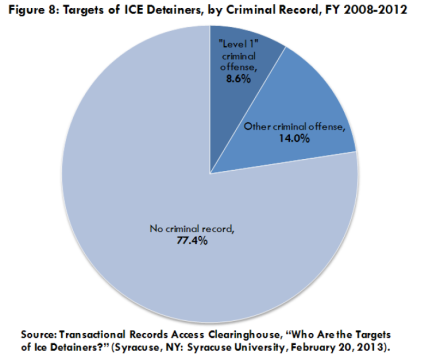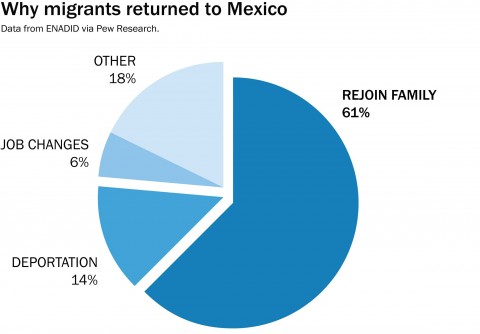 Immigration is nothing new to the social growth and development of the United States. Almost every man, woman and child can attribute their history to an ancestor who emigrated or was brought from somewhere other that North America. The culture shift and impact of immigrants has affected every state, Louisiana is no exception.
Immigration is nothing new to the social growth and development of the United States. Almost every man, woman and child can attribute their history to an ancestor who emigrated or was brought from somewhere other that North America. The culture shift and impact of immigrants has affected every state, Louisiana is no exception.
With president-elect Trump positioning his cabin, and ensuring the implementation of the policies that drove his campaign, does his rhetoric mirror the truth? Louisiana’s growing diversity through immigration has put the concept of America being a “Land of Opportunity” and a “Land of Laws” at odds. Whether you are for or against harsher immigration laws, the truth is, the contributions of immigrants to the United States will always remain.
“When Mexico sends its people, they’re not sending their best. They’re sending people that have lots of problems and they’re bringing those problems with us. They’re bringing drugs. They’re bringing crime. They’re rapists. And some, I assume, are good people, ” said president-elect Donald Trump at Trump Tower during is presidential announcement speech on June 16,2015.
It is estimated that roughly 64,500 undocumented immigrants live in Louisiana. This is a fraction of the 11.2 million that is estimated to live in the U.S. currently, as reported by the American Immigration Council. The AIC also concluded that immigrants are less likely than native-born citizens to engage in criminal behavior.
 Between 1990 and 2013, Crime rates in the United States have continued to trend downward, even though the illegal immigrant population swelled from 3.5 million to 11.2 million. The FBI reports that violent crime declined at a rate of 48 percent during that same time period and according to the American Community Survey, roughly 1.6 percent of immigrant males are incarcerated, compared to 3.3 percent of the native-born population.
Between 1990 and 2013, Crime rates in the United States have continued to trend downward, even though the illegal immigrant population swelled from 3.5 million to 11.2 million. The FBI reports that violent crime declined at a rate of 48 percent during that same time period and according to the American Community Survey, roughly 1.6 percent of immigrant males are incarcerated, compared to 3.3 percent of the native-born population.
 “ I don’t feel you can throw a blanket statement over a whole section of people and say “criminals”, after all the United States was built on the backs of immigrants and we are a nation of immigrants,” said writer/caregiver Richard Bryant IV, 34, of Shreveport, Louisiana.
“ I don’t feel you can throw a blanket statement over a whole section of people and say “criminals”, after all the United States was built on the backs of immigrants and we are a nation of immigrants,” said writer/caregiver Richard Bryant IV, 34, of Shreveport, Louisiana.
Undocumented immigrants in Louisiana make up 1 percent of the total population, but have earned more that $1 billion and are paying $136 million in taxes, according to research by The Partnership for a New American Economy. Other key findings found undocumented workers paid $42.7 million in state and local taxes and contributed $19.6 million to Medicare and $79.2 million to Social Security.
Nearly 73 percent of undocumented workers in Louisiana have been in the country five years or more. This indicates that some form of assimilation has taken place and suggests that large scale deportation efforts are unrealistic. To conclude its report, The Partnership for a New American Economy noted that more than half of undocumented workers speak English well, very well or fluently.
Majority of undocumented immigrants in Louisiana are here to work. The workers range in age from 25 to 64 and are reported to form 86 percent of the immigration population in the state. Roughly 10 percent or 1,724 of immigrants work in the agricultural sector. Others work in construction, food services, waste management services, which includes janitors, building cleaners and ground maintenance crews.
Many immigrants come to America in the hopes of opening their own businesses. The report provided by The Partnership for a New American Economy indicates that there are about 6,378 immigrant entrepreneurs in Louisiana. That translates to a business start up rate of about 12 percent, twice the rate of American citizens.
“I desired that my family had a better life than I had. Not experience hunger and poor living conditions due to not enough money, a dream to live and be different. I had no education and my work ethics were to labor and I just could not accept my future generations going through what I went through,” said Martin Zuniga, 54, production supervisor at Forterra Pipe and Precast in Oklahoma City, Oklahoma.
Zuniga was awarded amnesty in 1986, when president Reagan enacted the Immigration and Control Act. The act granted temporary legal status to any unauthorized immigrants who had been living in the United States continuously since 1982. The requirement was a $185 fee and a demonstration of good moral character throughout their residency in the U.S. The act made unauthorized immigrants eligible for green cards after 18 months, provided they learned to speak English.
Reform like Reagan’s prove that it is possible for the U.S. government to intervene and change current immigration laws. The initial impact of the reform of the 1980’s was seen immediately. The additional 2.7 million, now legal immigrants, worked and helped to drive up wages and contributed positively to the economy of that era.
“I believe immigrants are for America, yes. They help small businesses. There are a countless number of small businesses across this nation employing immigrants. So the very idea of this country being a place for the immigrant is so deeply ingrained in who we are that the idea of freedom and USA are synonymous at times. I think we’ve forgotten that,” said former Shreveport, Louisiana resident Marcos Moreno, 30, high rise window cleaner, who know lives in Williamsburg, Virginia.
The passing of Reagan’s reformation led to an exponential growth of illegal immigrants crossing the border, seeking the asylum promised by his administration. This caused the undocumented population to grow from 5 million in 1986 to more than 11 million today.
 Although the growth of illegal immigrants can be attributed to Reagan’s policies, the numbers show that more immigrants are beginning to leave the U. S. The Pew Research Center in conjunction with the National Survey of Demographic Dynamics, both show that over 1 million Mexican immigrants have left the U.S. for Mexico between 2009 and 2014. This is believed to be due to the recent recession that affected the U.S. in late 2000’s.
Although the growth of illegal immigrants can be attributed to Reagan’s policies, the numbers show that more immigrants are beginning to leave the U. S. The Pew Research Center in conjunction with the National Survey of Demographic Dynamics, both show that over 1 million Mexican immigrants have left the U.S. for Mexico between 2009 and 2014. This is believed to be due to the recent recession that affected the U.S. in late 2000’s.
How does this affect Louisiana currently? Despite the statistics that support the immigrant population, many disagree and argue that the losses due to illegal immigration are the main factor driving divisive rhetoric. According to the Federation for American Immigration Reform (FAIR), the annual costs to Louisiana’s taxpayers were estimated at $224 million. This figure was counted before state revenue from illegal immigrants was counted. FAIR claimed that the undocumented population has leveled off and also reported the following breakdown of costs to Louisiana’s taxpayers:
- $132 million went to education
- $22 million to healthcare
- $19.2 million to justice and law enforcement
- $18.4 million to public assistance
- $33 million to general government services
“ As a grandchild of Mexican immigrants, I’m familiar with what it takes to get here and it is incredibly difficult. Just being here is a massive victory over real dangers to life and limb. Most immigrants understand this viscerally. They know how lucky they are and cherish it. Who’s going to mess that up,” Moreno said.
Unfortunately, immigration policy seems to be frequently shaped more by fear and stereotype than by evidence, which is partly why immigrants are often labeled and treated like criminals. With our president-elect labeling immigrants as threats, the negative connotation of the illegal criminal immigrant thrives.
“ I feel that president Trump can get us all to a point of turmoil and sadness, the way he speaks lacks tremendous amounts of education and the understanding of how strong we all are. We come from the depths of deprivation, poor living conditions from another country that has a government that cares a lot less than this one,” Zuniga said.
Zuniga serves as one example of the many that cross our borders in search for a better life each year. The perseverance and fortitude necessary to make a jump into the unknown is true to the American spirit. When we can learn to successfully combine the concepts of America being a “land of laws” with a “land of opportunity”, then can America truly be a place for “The American Dream” .